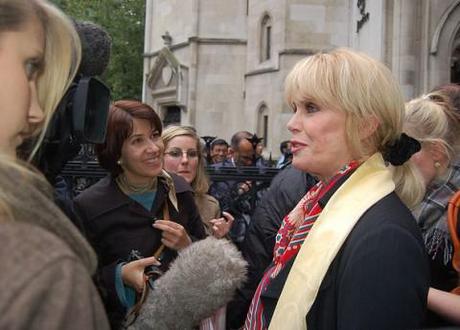
Joanna Lumley: Booker controversy. Photocredit: Liberal Democrats. http://www.flickr.com/photos/libdems/2903742811/sizes/z/in/photostream/
The Booker Prize was founded in 1968 by Tom Maschler, then managing director of Jonathan Cape; in 2002 it was taken over by the Man Group, which now sponsors the £50,000 prize money. Julian Barnes won it this year for his novella The Sense of an Ending; but over its long and distinguished history it’s been no stranger to controversy. There’s been some fun as well – In 1985, when Keri Hulme won with The Bone People, the gong was accepted on her behalf by a group of singing Maori tribeswomen. This year there’s been plenty of brouhaha, with the judges rounding on “so-called literary critics”, labelling them “pathetic” (this from Stella Rimington, ex-head of MI5) because they dared to suggest that the longlist might not have been very well chosen. David Sexton in The Evening Standard has gone further, attacking Rimington herself, suggesting that her novels – ploddy thrillers – were “quite bizarrely flat in tone”, and that she was often “more interested in laying on snacks for her characters than in international espionage.”
Susan Hill, another judge this year and herself a distinguished novelist, posted a list of “unreadable” books on Twitter, which included that well-known unreadable book, War and Peace.
1. Black Power. A S Byatt, when she won the Booker, bought a new swimming pool; Kingsley Amis chose some new curtains. But the money’s gone to more surprising places: In 1972, John Berger won it for his novel, G. He was a very angry young man, and in his acceptance speech he stated that the Booker (then sponsored by Booker McGonall) had garnered their wealth from trading in the Caribbean for 130 years, thus directly causing the poverty of the islands. He said he’d give half of the prize money to the Black Power movement. It would be nice, said Terence Blacker in The Independent, if he tried to lead the audience in a rendition of “Say it Loud, I’m Black and I’m Proud”, but he didn’t; nor did Susan Hill lead the audience in a rival chant of “Jerusalem.”
2. Small beer. The distinguished novelist Anthony Burgess dismissed the Booker as a “silly little British game”; he refused to turn up unless he was told he’d won in advance. Perhaps, suggested Blacker, he spontaneously combusted when he found out his rival William Golding had won instead.
3. Outside the Gents. Salman Rushdie, when nominated in 1983 for Shame (the second time – he’d already won with Midnight’s Children), told a journalist that he wouldn’t mind if he didn’t win since he already had one. J M Coetzee won. The journalist bumped into Rushdie outside the men’s loos. The hack began to console, suggesting that it was all right since he’d already won. “Oh fuck off,” said Rushdie.
4. It’s all rubbish. At least it was in 1975, when the judges – Susan Hill (again), Peter Ackroyd, Angus Wilson and Roy Fuller, decided that the state of fiction was in such a state that they could only come up with a shortlist of two, Heat and Dust by Ruth Prawer Jhabvala and Gossip from the Forest by Thomas Keneally. Jhabvala won.
5. Piranha infested waters. There was shock and horror in literary circles in 1985. For why? Well, they chose someone totally unsuitable to be a judge – an actress. Brainy beauty Joanna Lumley was on the panel, but Norman St John-Stevas didn’t think she should be on it. Lumley was against The Bone People – but the other panellists got together without her and declared it the winner, causing Lumley to comment that the “so-called bitchy world of acting was a Brownies tea party compared with the piranha-infested waters of publishing.”

